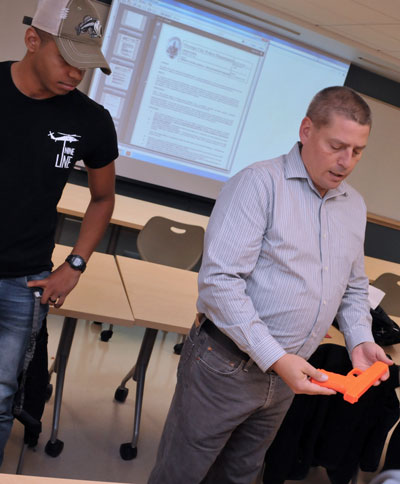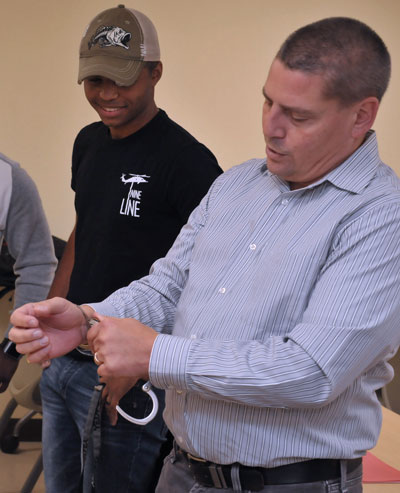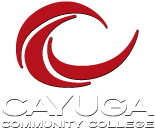CRIMINAL JUSTICE A.S.
The Criminal Justice program builds a critical foundation for employment in law enforcement, court systems, and institutional or community–based corrections. A strong base in social and behavioral science curriculum is also provided. The program is devised for students to enter various entry-level fields or to transfer to a four-year institution offering a criminal justice or closely related major if desired.

PROGRAM LEARNING OUTCOMES
Upon successful completion of this program, graduates will be able to:
- Identify, understand, and analyze the history, philosophy, and functions of the criminal justice system in American society.
- Identify, understand, and analyze law enforcement's history, philosophy, and functions in American society.
- Identify, understand, and analyze the American correctional system's history, philosophy, and functions, including institutional and community corrections.
- Identify, understand, and analyze the U.S. and N.Y. state penal law, criminal procedures, and policies.
- Identify, understand, and analyze the role of social and behavioral sciences in the criminal justice system.
- Demonstrate and apply effective and professional oral and written communication skills.
- Demonstrate and understand professionalism as it relates to the criminal justice discipline.
- Apply critical thinking skills to the various aspects of the criminal justice discipline.
- Promote ethical and professional standards and collaborative learning as it relates to the criminal justice discipline.
- Interpret and apply cultural diversity, equity, and inclusion through various techniques as it relates to the criminal justice discipline.
CAREER POSSIBILITIES
Career opportunities will vary, including, but not limited to, local, state, and federal Law Enforcement Officers/Agents (Road Patrol or Custody Divisions), Emergency Communications, Investigators, Court Advocates, Paralegals, Attorneys, Analysts, Diversion Advocates, Correction Officers, Supervisors of Correctional Officers, juvenile detention centers, Victim Advocates, case managers, or Case Counselors and Probation or Parole Officers. Some of the above-referenced positions begin with an A.S. at Cayuga but may require a transfer to a four-year institution for additional education.
NOTE: Civil service exams may be required for criminal justice positions, specific physical requirements, and an extensive background investigation. Additional education and training may be required for certain professions.
TRANSFER INFORMATION
Students planning to transfer to a four-year institution degree program in Criminal Justice or a related degree program should contact their advisor, the Coordinator for Transfer and Articulation in the Centers for Student Engagement and Academic Advisement, or the Criminal Justice Coordinator to plan the most appropriate course sequence for optimal transferability.
It is highly suggested that students who wish to transfer complete their current degree program in its entirety unless they have met with the appropriate staff and a more comprehensive plan is attained.
The criminal justice department offers articulation (transfer) agreements with four-year institutions that include:
- SUNY Oswego for Criminal Justice (B.A.)
- SUNY Canton for:
- Emergency Management (B.S.)
- Criminal Investigation (B. Tech)
- Criminal Justice: Law Enforcement Leadership (B. Tech)
- Homeland Security (B. Tech)
- Crime Analysis (B.S.)
- Forensic Criminology (B.S.)
- SUNY Empire (B.A.)
GENERAL INFORMATION
- All first semester (freshman) students are HIGHLY ENCOURAGED to attend an orientation session either in the Fall or Spring semester depending on their enrollment semester.
- Students with criminal histories may not be able to obtain a position in the criminal justice field. Please consult with an Admissions Counselor or the Cayuga Criminal Justice Coordinator before matriculating in a criminal justice degree program.
- Body art, piercings, and tattoos may be discouraged in some criminal justice professions for various reasons such as safety of the officer/agent. If you have questions relative to such, complete some research on your agency of choice or consult with Cayuga’s Criminal Justice Coordinator.
- Communication, written and verbal, is essential in criminal justice professions. You will be required to effectively demonstrate the various modes of communication, through your required classes, presentations and such before graduation. Cayuga’s criminal justice programs’ embrace the liberal arts component of education that includes physical science, math and English skills.

ONLINE LEARNING
Cayuga’s Criminal Justice A.S. program offers a flexible and convenient way to earn you’re A.S. degree in criminal justice. The student can combine their coursework to include both on campus and/or online instruction or the program is available 100% online. Learn more about Cayuga’s online learning experience by clicking here.
SCHOLARSHIPS
Several scholarships are awarded to various students throughout the academic year. Click on the scholarships below to obtain additional information.
- New York State Sheriff’s Association
- Testa Family Scholarship
- Ward Family Scholarship
- Auburn Police Union Local 195
DEGREE REQUIREMENTS
The program provides a general insight into the criminal justice system and process. It offers a foundational level of knowledge while allowing the student to explore the discipline’s differing aspects in law, courts, and corrections. If the student chooses, Cayuga offers five specific concentrations (optional) that will immerse the student in courses designed for destined positions in law enforcement, homeland security, juvenile justice, crime analyst/intelligence, or probation assistant.
The curriculum listed on this page represents the minimum coursework required for the AS degree in Criminal Justice. The Chair of the Division of Behavioral/Social Sciences, Business, Criminal Justice, Teacher Education, and Physical Education/Health must approve any major course exceptions.
The candidate for the AS in Criminal Justice program must meet the following requirements:
- Completion of all required credits (61-62 total)
- A cumulative average of no less than 2.0
| COURSES | CREDIT HOURS | |
|---|---|---|
| FIRST SEMESTER | ||
| ENGL 101 | Freshman English I | 3 |
| CJ 111 | Introduction of Justice Systems | 3 |
| CJ 115 | Criminal Law | 3 |
| PSY 101 | Introductory Psychology | 3 |
| Gen Ed Elective | 3 | |
| SUB-TOTAL | 15 | |
| SECOND SEMESTER | ||
| ENGL 102 | Freshman English II | 3 |
| HIST 103-105 | U.S. History | 3 |
| Gen Ed Natural Science | 3-4 | |
| Elective/Concentration Requirement | 3 | |
| Elective/Concentration Requirement | 3 | |
| SUB-TOTAL | 15-16 | |
| THIRD SEMESTER | ||
| MATH 121 OR MATH 214 |
Fundamental Statistics Using Technology OR Statistics |
3 |
| CJ 230 | CJ Ethics | 3 |
| SOC 101 | Introductory Sociology | 3 |
| World History and Global Awareness/Arts Gen Ed | 3 | |
| Elective/Concentration Requirement | 3 | |
| HLTH or PE credit | 1 | |
| SUB-TOTAL | 16 | |
| FOURTH SEMESTER | ||
| CJ 220 | Criminology | 3 |
| ENGL 220 OR 221 OR 222 |
Interpersonal Communications OR Effective Speech: Public Address OR Effective Speech: Group Discussion |
3 |
| Gen Ed Elective | 3 | |
| Elective/Concentration Requirement | 3 | |
| Elective/Concentration Requirement | 3 | |
| SUB-TOTAL | 15 | |
| TOTAL CREDIT HOURS | 61-62 | |
CRIMINAL JUSTICE A.S. CONCENTRATIONS
Homeland Security
| COURSES | CREDIT HOURS | |
|---|---|---|
| CJ 140 | Introduction to Homeland Security | 3 |
| CJ 170 | Emergency Management | 3 |
| CJ 222 | Constitutional Law | 3 |
| CJ 240 | Threats to Homeland Security | 3 |
| BUS 225 | Micro Application Software | 3 |
Juvenile Justice
| COURSES | CREDIT HOURS | |
|---|---|---|
| CJ 117 | Juvenile Delinquency | 3 |
| CJ 213 | Community Corrections | 3 |
| BUS 225 | Micro Application Software | 3 |
| PSY 215 | Child Psychology | 3 |
| PSY 216 | Adolescent Psychology | 3 |
Law Enforcement
| COURSES | CREDIT HOURS | |
|---|---|---|
| CJ 119 | Criminal Investigations | 3 |
| CJ 123 | Laws of Evidence | 3 |
| CJ 131 | Introduction to Law Enforcement | 3 |
| CJ 222 | Constitutional Law | 3 |
| CHEM 108 | Forensic Chemistry | 3 |
Probation Officer Assistant
| COURSES | CREDIT HOURS | |
|---|---|---|
| CJ 132 | Introduction to US Courts | 3 |
| CJ 133 | Introduction to Corrections | 3 |
| CJ 213 | Community Corrections | 3 |
| HS 101 | Introduction to Human Services | 3 |
| BUS 225 | Micro Application Software | 3 |
Crime Analysis & Intelligence
| COURSES | CREDIT HOURS | |
|---|---|---|
| CJ 150 | Introduction to Crime Analysis | 3 |
| CJ 250 | Crime Analysis & Intelligence | 3 |
| GIS 111 | Introduction to GIS | 3 |
| GIS 205 | Introduction to Vector GIS | 3 |
| BUS 225 | Micro Application Software | 3 |
